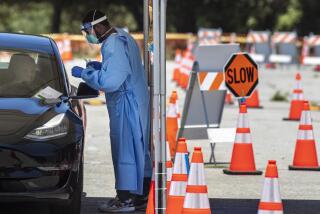Weapon in Fight Against Heart Disease : Mass Cholesterol Screening Urged
- Share via
ANAHEIM — A quarter-million lives could be saved each year if Americans were tested for high levels of blood cholesterol at offices, schools, stores and airports, says a former president of the American Heart Assn.
“It could achieve a dramatic reduction in the death rate from coronary heart disease, which is the number one killer in our country,” said Dr. Antonio Gotto, who also is chairman of internal medicine at Baylor College of Medicine in Houston and a co-author of two books with famed heart surgeon Michael DeBakey.
Such a mass-screening program, coupled with appropriate dietary changes or drug treatment for those with excess blood levels of the animal fat, “might save as many as 250,000 to 300,000 lives a year,” Gotto said at the American College of Cardiology’s annual meeting.
Heart association figures show about 900,000 Americans each year die from all forms of cardiovascular disease.
Program Possible
Gotto, who ended his term as the group’s president a few months ago, said the association now is considering a program to test people at their offices for excess cholesterol.
The Houston cardiologist is mounting a personal crusade to get the government, employers, drug companies or others to start a nationwide program in which blood samples would be taken from the fingers of millions of Americans for testing.
It could be modeled after the successful mass-testing program for high blood pressure in the early 1970s--an effort that led to dramatic improvements in the control of hypertension in millions of Americans, Gotto said.
Besides in offices, the tests “could be done at schools, shopping centers, airports, community centers, clinics and doctors’ offices,” he said.
Gotto expects at least one drug firm, Biodynamics, to start a pilot program by year’s end. The company, a division of the German drug firm Boeringer-Mannheim, is developing a device to measure cholesterol in blood taken from “finger sticks” in a two-minute test that would cost $1, Gotto said, noting that the existing test requires blood from a vein and costs $8 to $20.
Eastman Kodak and Ames, both American firms, are developing another type of simple test, he added.
Opposed by Some Doctors
Gotto acknowledged that there is some opposition to mass testing by doctors who believe it would be wiser to wait until better drugs are developed to lower cholesterol. But he said most people would need only to improve their diets, and a testing program would create demand for better drugs, giving pharmaceutical firms a strong incentive to develop them.
Gotto cited numerous studies, including a 10-year effort completed last year by the National Heart, Blood and Lung Institute, that prove a reduction in levels of cholesterol in blood can prevent the risk of heart attack, heart pain, hardening of the arteries and other forms of coronary heart disease.
The institute’s study led to a meeting in Bethesda, Md., last December during which the nation’s top cholesterol experts issued definitions of excess cholesterol and recommended creation of a nationwide cholesterol education program.
The institute has not taken any position on the idea of mass screening and is still devising its cholesterol education program, said Dr. Eliot Corday, a Los Angeles heart specialist who served on an agency advisory panel.
More to Read
Sign up for Essential California
The most important California stories and recommendations in your inbox every morning.
You may occasionally receive promotional content from the Los Angeles Times.










